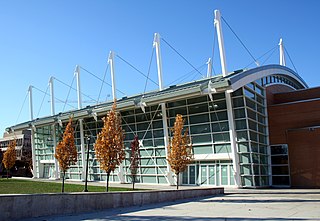The National Center on Education and the Economy is a US nonprofit organization.
NCEE may also refer to:
- National College Entrance Examination
- National Center for Education Evaluation, part of the Institute of Education Sciences
The National Center on Education and the Economy is a US nonprofit organization.
NCEE may also refer to:
Structural engineers analyze, design, plan, and research structural components and structural systems to achieve design goals and ensure the safety and comfort of users or occupants. Their work takes account mainly of safety, technical, economic, and environmental concerns, but they may also consider aesthetic and social factors.
The Fundamentals of Engineering (FE) exam, also referred to as the Engineer in Training (EIT) exam, and formerly in some states as the Engineering Intern (EI) exam, is the first of two examinations that engineers must pass in order to be licensed as a Professional Engineer (PE) in the United States. The second exam is the Principles and Practice of Engineering exam. The FE exam is open to anyone with a degree in engineering or a related field, or currently enrolled in the last year of an Accreditation Board for Engineering and Technology (ABET) accredited engineering degree program. Some state licensure boards permit students to take it prior to their final year, and numerous states allow those who have never attended an approved program to take the exam if they have a state-determined number of years of work experience in engineering. Some states allow those with ABET-accredited "Engineering Technology" or "ETAC" degrees to take the examination. The exam is administered by the National Council of Examiners for Engineering and Surveying (NCEES).
The National Council of Examiners for Engineering and Surveying (NCEES) is an American non-profit organization dedicated to advancing professional licensure for engineers and surveyors. The Council’s members are the engineering and surveying licensure boards from all 50 U.S. states, the District of Columbia, Guam, Northern Mariana Islands, Puerto Rico and the U.S. Virgin Islands. These boards are divided into four geographic zones: Central, Northeast, Southern, Western. It is headquartered in Greenville, South Carolina.
Education policy consists of the principles and policy decisions that influence the field of education, as well as the collection of laws and rules that govern the operation of education systems. Education governance may be shared between the local, state, and federal government at varying levels. Some analysts see education policy in terms of social engineering.

The Agusan del Sur State University, formerly known as the Agusan del Sur State College of Agriculture and Technology (ASSCAT), is a chartered state university in Bunawan, Agusan del Sur, Philippines through Republic Act (RA) No. 7932 approved on March 1, 1995, and RA No. 11586.

The American University of Sharjah is a private university in Sharjah, United Arab Emirates. It was founded in 1997 by Sultan bin Muhammad Al-Qasimi, Supreme Council Member and Ruler of Sharjah. Located in University City in Sharjah, AUS has more than 5,000 students from more than 94 countries and a full-time faculty of more than 360 from 48 countries.
The Certificate of Mastery (CIM) was created by report "America's Choice: High Skills or Low Wages". The CIM has been called an outcome-based education diploma as it would be necessary to either receive or replace the high school diploma, and was characteristic of education reform legislation in many states such as Washington and Oregon.
The National Center on Education and the Economy (NCEE) is an American not-for-profit education research, advocacy, and educator professional learning organization based in Washington, DC, that first formed in 1988 as the Carnegie Forum on Education and the Economy.
Education reform in the United States since the 1980s has been largely driven by the setting of academic standards for what students should know and be able to do. These standards can then be used to guide all other system components. The SBE reform movement calls for clear, measurable standards for all school students. Rather than norm-referenced rankings, a standards-based system measures each student against the concrete standard. Curriculum, assessments, and professional development are aligned to the standards.

Electrical/Electronics engineering technology (EET) is an engineering technology field that implements and applies the principles of electrical engineering. Like electrical engineering, EET deals with the "design, application, installation, manufacturing, operation or maintenance of electrical/electronic(s) systems." However, EET is a specialized discipline that has more focus on application, theory, and applied design, and implementation, while electrical engineering may focus more of a generalized emphasis on theory and conceptual design. Electrical/Electronic engineering technology is the largest branch of engineering technology and includes a diverse range of sub-disciplines, such as applied design, electronics, embedded systems, control systems, instrumentation, telecommunications, and power systems.

The Institute of Education Sciences (IES) is the independent, non-partisan statistics, research, and evaluation arm of the U.S. Department of Education. IES' stated mission is to provide scientific evidence on which to ground education practice and policy and to share this information in formats that are useful and accessible to educators, parents, policymakers, researchers, and the public. It was created as part of the Education Sciences Reform Act of 2002.
Engineer in training, or EIT, is a professional designation from the National Council of Examiners for Engineering and Surveying (NCEES) used in the United States to designate a person certified by the state as having completed two requirements:
The Test of Economic Literacy or TEL is a standardized test of economics nationally norm-referenced in the United States for use in upper-grade levels of high schools. It is one of four grade-level specific standardized economics tests sponsored and published by the National Council on Economic Education (NCEE).
The Basic Economics Test or BET is a standardized test of economics nationally norm-referenced in the United States for use in the upper-grade levels of elementary schools. It is one of four grade-level specific standardized economics tests sponsored and published by the National Council on Economic Education (NCEE).

The Test of Understanding in College Economics or TUCE is a standardized test of economics nationally norm-referenced in the United States for use at the undergraduate level, primarily targeting introductory or principles-level coursework in economics. It is one of four grade-level specific standardized economics tests sponsored and published by the National Council on Economic Education (NCEE).
The Test of Economic Knowledge or TEK is a standardized test of economics nationally norm-referenced in the United States for use in middle schools and in lower-grade levels of high schools. It is one of four grade-level specific standardized economics tests sponsored and published by the National Council on Economic Education (NCEE).
The Principles and Practice of Engineering exam is the examination required for one to become a Professional Engineer (PE) in the United States. It is the second exam required, coming after the Fundamentals of Engineering exam.
The De Los Santos – STI College of Health Professions was a merged institute between the De Los Santos College and STI College. It is located along Epifanio Rodriguez Sr. Boulevard, in Quezon City, Philippines.

Architectural engineering or architecture engineering, also known as building engineering, is a discipline that deals with the engineering and construction of buildings, such as environmental, structural, mechanical, electrical, computational, embeddable, and other research domains. It is related to Architecture, Mechatronics Engineering, Computer Engineering, Aerospace Engineering, and Civil Engineering, but distinguished from Interior Design and Architectural Design as an art and science of designing infrastructure through these various engineering disciplines, from which properly align with many related surrounding engineering advancements.
The National Achievement Test (NAT) is a standardized set of examinations taken in the Philippines by students in Grades 3,6,10 to 12. The test is designed to determine their academic levels, strengths and weaknesses, as well as their knowledge learnt in major subjects throughout the year.